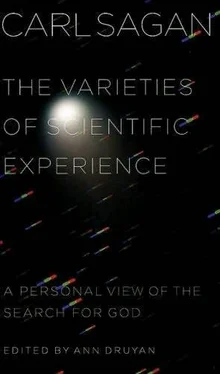Now, bearing this in mind, who will say that there are human emotions that will not, at least one day, be understood in some fundamental manner in the language of molecular biology and neuronal architecture? If you run through our own society and other societies, you find a vast range of substances, many of them chemically very distinct, that powerfully affect mood and emotion and behavior. Not just ethanol but caffeine, mushrooms, amphetamines, tetrahydrocannabinol and the other cannabinoids, lysergic acid diethylamide-known as LSD- barbiturates, Thorazine. It's a very long list.
This prompts certain questions: Are all human emotions to some extent mediated by molecules? If a molecule ingested from the outside can change behavior, is there generally some comparable molecule on the inside that can change behavior? This is now a field that has made remarkable progress. I'm talking about the enkephalins and the endorphins, which are small brain proteins.
In labor, women are amazingly strong in bearing pain, and of course there is a great deal of pain in childbirth. But in that case and in many other traumatic situations, the human body produces a particular molecule that reduces our susceptibility to pain. And it does it for very good survival reasons, which are not hard to understand. There are specific receptors in the brain for these small brain proteins, and it turns out that the opiates ingested from the outside are extremely similar chemically to a particular enkephalin having to do with resistance to pain that is produced on the inside; that is, it is looking as if every time a molecule on the outside does something about human emotions, there is a related molecule on the inside that is naturally produced, which is how it is that we have a brain receptor for this particular kind of molecular functional group.
Let me be a little less abstract and speak from personal experience. I go to the dentist, and he gives me an injection of Adrenalin. It is a molecule. It's a molecule produced in your body, but it's also produced outside. And every time I've had this injection, I'm almost overcome with two contradictory emotions, one of which is to attack the dentist and the other is to leave the dentist's office, both of which I suppose could be understood just on purely rational grounds, considering the circumstances. But this is what adrenaline, the hormone epinephrine, does under any circumstances, under the most benign circumstances. It's called the fight-or-flight syndrome. This molecule makes you either aggressive or, if you want to think about running away, cowardly, one or the other. Very remarkable that two such apparently contradictory emotions can be brought about by the same molecule. But more important than that, it's extremely interesting. They just put this molecule in your bloodstream, and suddenly you feel things. It's just a function of the molecule being there. It's nothing, necessarily, in the external world. And we can understand the reasons for that. Consider our remote ancestors faced with, let us say, a pack of hyenas, not having yet deduced that hyenas with fangs bared are dangerous. It would be too inefficient to have our ancestor consciously stop and think, "Oh, I see those beasts have sharp teeth; they probably can eat somebody. They're coming at me. Maybe I should run away." By then it's too late.
What you need is one quick look at the hyena, and instantly the molecule is produced, and you run away, and later you can figure out what happened. And you can see two populations, one of whom has to slowly think the matter out, the other of whom can rapidly respond to the adrenaline. After a while these guys leave lots of offspring, those guys don't. Everybody winds up generating adrenaline. Natural selection. Not hard to understand how that comes about. And there are, of course, many other molecules like that.
Another one is testosterone, which is produced in males at adolescence and instigates all sorts of bizarre behavior that we all know. I don't want to suggest that at the same age I was immune from it. I personally know the consequences of testosterone poisoning. You might imagine that our distant ancestors could figure out that it was useful to propagate the species and leave offspring and had an intellectual understanding of how it comes about. But this is very iffy. It's requiring a great deal of intellectual activity and cerebration, and it's much better to simply have the whole thing hardwired in the brain and triggered by this molecule after the biological clock has ticked away for a certain period of time. And so the presence of an attractive member of the opposite sex immediately leads to this sequence of events, and the species continues.
There are many other such molecules. Of course, females have estrogen and other hormones. The number of sex hormones is more than one each. Statistics on the subjects that adults of all ages dream about most have sex very high up, and everything else is far below. It's clear the more interested in sex people are, generally speaking, the more offspring they tend to leave, at least before the invention of birth-control devices, and so there is a selective advantage for each species to have this kind of internal machinery.
In just the same ways as the enkephalins and the endorphins and sex hormones influence our sexual activity, what about hormones and religion? People certainly have spontaneous religious experiences. Sometimes they're brought about by deprivation, as with the fasting monks in the desert. There are a number of ways in which sensory deprivation can bring about these experiences. They also happen spontaneously to people in many different cultures, always using the language of the indigenous culture to describe the experience. But also they can be brought about in a molecular way. And certainly the uniform experience, especially in the 1950s and '60s-pioneered by Aldous Huxley and others-was that LSD and other such molecules produce religious experiences. And there were many religionists who objected to this, because they thought it was too easy; that is, you're not supposed to have a religious experience without doing some significant personal deprivation. Just taking, whatever it was, five hundred micrograms of a tablet, was considered too easy.
Let's say there's a molecule that produces a religious experience, whatever the religious experience is. How does that come about? Virtually every time someone takes that molecule, he or she has a religious experience. Does that not suggest that there is a natural molecule that the body produces whose function it is to produce religious experiences, at least on occasion? What could that molecule be like? Let's give it a name, since nobody's discovered it yet, and of course it may not exist-a good one would be "theophilline," but that has already been preempted for an antiasthma drug. And I think "theotoxin" would be biasing the issue too strongly. So let's call it "theophorin," a material that makes you feel religious.
What could the selective advantage of a theophorin be? How would it come about? Why would it be there? Well, what is the nature of the experience? The nature of the experience has, as I say, many different aspects. But one uniform aspect of it is an intense feeling of awe and humility before a power vastly greater than ourselves. And that sounds to me very much like a dominance-hierarchy molecule or part of a suite of molecules whose function it is to fit us into the dominance hierarchies-to suit us for the quest that was, according to Dostoyevsky to strive for nothing so incessantly and so painfully as to find someone to worship and obey.
Now, what's the good of that? Why would that have any selective advantage? If for no other reason, it would produce social conformity, or, put in more favorable terms, it would ensure social stability and morality. And this is, of course, one of the principal justifications of religion. Any cosmological aspect of the deities is an entirely separate attribute. Consider how we bow our heads in prayer, making a gesture of submission that can be found in many other animals as they defer to the alpha male. We're enjoined in the Bible not to look God in the face, or else we will die instantly. Submissive males of many species, including our own, avert their eyes before the alpha male. In the court of Louis XIV, as the king passed, he was preceded by courtiers crying "Avertez les yeux! Avert the eyes! Don't look up. He's passing." And to this day many animals with a taste for dominance can be made aggressive simply by looking them in the eye.
Читать дальше










